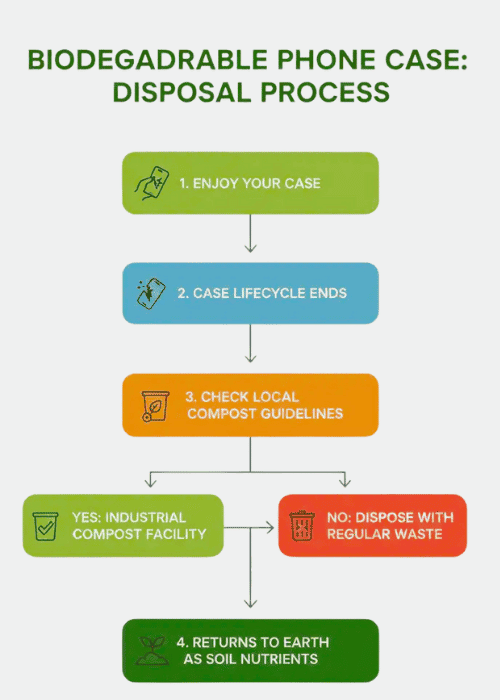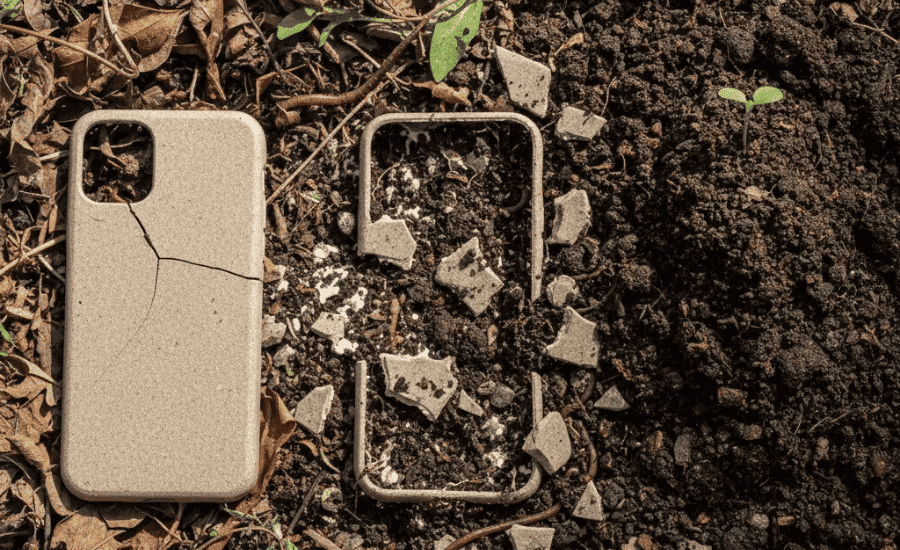Compostable And Biodegradable
How to Dispose of Compostable Phone Cases Properly
Making the switch to a compostable phone case is an excellent step towards reducing plastic waste, but knowing how to dispose of it correctly is just as important as choosing an eco-friendly option in the first place. Unlike traditional plastic cases that can persist in landfills for centuries, compostable phone cases made from materials like PLA/PBAT and bamboo fibres are designed to break down naturally, but only under the right conditions.
TL;DR: This article explains how “compostable” phone cases (made from materials like PLA/PBAT and bamboo fibres) differ from traditional plastics, outlines that most need industrial composting (not home composting), and gives UK-specific advice on disposing of them (via council food‐waste bins, private services or specialist recycling), while warning against placing them in plastic recycling streams.
What Makes a Phone Case Truly Compostable?
Before we dive into disposal methods, it’s essential to understand what “compostable” actually means. Not all biodegradable materials are created equal, and the term “compostable” has specific requirements.
Compostable phone cases, such as those made from PLA (polylactic acid), PBAT (polybutylene adipate terephthalate), and bamboo fibres, are certified to break down into natural elements within a specific timeframe when exposed to the right conditions. These materials are derived from renewable resources—PLA comes from plant starches like corn, while PBAT is a biodegradable copolyester, and bamboo fibres offer natural strength and sustainability.
For a product to be certified compostable in Europe, it must meet the EN 13432 standard, which requires the material to disintegrate within 12 weeks and fully biodegrade within 180 days in industrial composting conditions, leaving no toxic residue behind.
Understanding Your Compostable Phone Case Materials
Most high-quality compostable phone cases, including biodegradable phone cases made from PLA/PBAT blends with bamboo fibres, are designed to be sturdy enough to protect your device while remaining environmentally friendly at their end of life.
PLA/PBAT blend: This combination offers the rigidity of PLA with the flexibility of PBAT, creating a durable case that maintains compostability. PLA provides structure, while PBAT improves impact resistance and flexibility.
Bamboo fibres: Added for reinforcement, bamboo is a rapidly renewable resource that enhances the case’s strength while contributing to its biodegradability.
These materials won’t break down in your pocket or when exposed to everyday moisture, but they will decompose when placed in proper composting environments with the right temperature, moisture, and microbial activity.
Can You Home Compost a Phone Case?
This is one of the most common questions about compostable phone case disposal, and the answer requires some nuance.
The short answer: Most compostable phone cases, including those made from PLA/PBAT and bamboo fibres, are certified for industrial composting rather than home composting.
Why the distinction matters: Home compost bins typically don’t reach the sustained high temperatures (55-60°C) required to break down PLA-based materials effectively. Industrial composting facilities maintain these elevated temperatures consistently, along with optimal moisture levels and regular turning to promote microbial activity.
While bamboo fibres may begin to break down in a home compost environment, the PLA/PBAT components will likely remain intact for an extended period. Attempting to home compost these cases may result in them sitting in your compost heap for years without meaningful decomposition.
Exception: Some compostable products are specifically certified for home composting. Always check your phone case’s certification. If it carries the OK compost HOME certification in addition to EN 13432, it may be suitable for home composting.
How to Dispose of Compostable Phone Cases in the UK
Now, let’s explore the proper disposal methods available in the UK for your compostable phone case.
1. Industrial Composting Facilities
Industrial composting is the gold standard for disposing of certified compostable phone cases. These facilities create optimal conditions for biodegradation with controlled temperature, moisture, and oxygen levels.
How to access industrial composting in the UK:
- Council food waste collections: Many UK councils now offer food waste collection services (often in brown or green bins). However, not all councils accept compostable packaging and products in these collections. Contact your local council to ask specifically about compostable bioplastic items.
- Private composting services: Some areas have private composting companies that accept certified compostable products. Services like Compost Club operate in certain UK regions and may accept compostable items beyond standard food waste.
- Community composting sites: Check if your area has community composting initiatives that have access to industrial composting. Organisations like Community Composting Network can help you locate nearby options.
2. Specialist Recycling Services
Several UK organisations specialise in collecting and processing compostable bioplastics:
TerraCycle UK operates various recycling programmes, though availability changes. Check their website to see if they currently accept compostable phone cases or similar bioplastic products.
Zero Waste Collection Schemes: Some zero-waste shops and eco-friendly retailers offer take-back schemes for compostable products. While these are more common for packaging, it’s worth enquiring locally.
3. What If Industrial Composting Isn’t Available?
If you cannot access industrial composting facilities in your area, you have a few options:
Landfill with caveats: While not ideal, disposing of a compostable phone case in general waste (landfill) is still better than sending a traditional plastic case. The case will eventually break down, though much more slowly than in composting conditions. Importantly, it won’t release harmful microplastics or toxic chemicals as it degrades.
Save for future infrastructure: You might consider storing used compostable phone cases until industrial composting becomes available in your area. The UK government has committed to expanding food waste collection to all households in England by 2026, which may open up new disposal options.
Burial in soil: As a last resort, you could bury the phone case in an area of undisturbed soil in your garden, where it will slowly biodegrade over several years. This isn’t optimal, but it allows natural decomposition to occur.

Common Mistakes to Avoid
When disposing of your compostable phone case, avoid these common pitfalls:
Don’t place in plastic recycling: Compostable bioplastics contaminate traditional plastic recycling streams. Never put your compostable case in plastic recycling bins.
Don’t assume all “biodegradable” claims are equal: Only products with certified compostable standards (like EN 13432 or OK Compost) will reliably break down. Generic “biodegradable” claims may not meet these standards.
Don’t mix with conventional plastic: Keep your compostable case separate from conventional plastic waste to prevent contamination in either direction.
Don’t expect instant results in home compost: If you do attempt home composting despite the recommendations, understand that decomposition may take years, not months.
Maximising the Lifespan of Your Compostable Phone Case
The most sustainable choice is always to use products for as long as possible before disposal. Here’s how to extend your compostable phone case’s life:
- Clean it regularly with a damp cloth and mild soap to prevent dirt buildup
- Avoid extreme temperatures, which can accelerate degradation
- Remove and reattach carefully to prevent stress on the material
- Consider multiple uses if the case still provides adequate protection after upgrading your phone
The longer you use your case, the more you reduce the environmental impact per year of use.
The Bigger Picture: Why Proper Disposal Matters
The UK produces approximately 2 million tonnes of plastic packaging waste annually, with 90 billion plastic items discarded by households each year. While phone cases represent a small fraction of this waste, every sustainable swap matters.
When compostable phone cases are disposed of correctly through industrial composting, they:
- Return nutrients to the soil rather than persisting as waste
- Avoid contributing to microplastic pollution in oceans and ecosystems
- Reduce reliance on fossil-fuel-based plastics
- Support the growing circular economy infrastructure
Research has shown that 77% of microplastics have been found in the blood of healthy mothers, raising concerns about infant exposure. Choosing compostable alternatives and disposing of them properly is one way to reduce this pervasive pollution.
Future of Compostable Product Disposal in the UK
The landscape for composting in the UK is evolving rapidly. The government’s commitment to universal food waste collection by 2026 will significantly expand access to industrial composting facilities. This infrastructure development will make the proper disposal of compostable products, including phone cases, much more accessible.
Additionally, as consumer demand for sustainable products grows, we’re likely to see more take-back schemes, improved collection systems, and clearer labelling standards for compostable items.
Make the Switch to Compostable Phone Cases Today
Understanding how to dispose of compostable phone cases properly ensures your eco-friendly choice makes the maximum positive impact. While the disposal infrastructure in the UK is still developing, choosing certified compostable products sets you ahead of the curve and supports the growth of sustainable systems.
Explore our range of compostable phone cases made from PLA/PBAT and bamboo fibres, certified to EN 13432 standards. Each case is designed to protect your device during use and return harmlessly to the earth at the end of life—when disposed of correctly.
Ready to reduce your plastic footprint? Browse our collection and join thousands of UK customers making the switch to truly sustainable everyday essentials. Have questions about composting or our products? Get in touch, and our team will be happy to help.
Frequently Asked Questions
To dispose of a biodegradable phone case properly, first check if it has EN 13432 or OK Compost certification. Contact your local council to see if they accept compostable bioplastics in food waste collections. The best option is industrial composting facilities where cases made from PLA/PBAT and bamboo fibres break down within 180 days. Avoid putting biodegradable cases in plastic recycling bins as they contaminate the recycling stream.
Don’t throw away old phone cases immediately. If they’re still functional, continue using them, donate to charity shops, or pass them to friends with compatible phones. Traditional plastic cases can be repurposed as storage containers for small items. Only dispose of phone cases when they’re damaged beyond use. For compostable cases, use industrial composting; for plastic cases, check TerraCycle programmes or mobile retailer take-back schemes.
Traditional plastic phone cases cannot go in kerbside recycling bins as they contaminate recycling streams. Instead, check with mobile phone retailers like O2 for take-back schemes, use TerraCycle drop-off locations, or visit household waste recycling centres that accept small electronic accessories. Compostable phone cases aren’t recycled traditionally—they should be processed through industrial composting facilities or council food waste collections that accept compostable bioplastics.
The best way to get rid of phone cases follows this hierarchy: continue using as long as functional, donate or sell if in good condition, repurpose for alternative uses, then dispose responsibly. For compostable cases, use industrial composting facilities or council food waste collections. For traditional plastic cases, use TerraCycle programmes or specialist recycling schemes. As a last resort, place in general waste, though compostable cases are better suited for landfill than plastic, as they break down without releasing microplastics.
In industrial composting conditions (55-60°C with optimal moisture and microbial activity), a certified compostable phone case should disintegrate within 12 weeks and fully biodegrade within 180 days, as per EN 13432 standards.
Most compostable phone cases are certified for industrial composting, not home composting. Home compost bins typically don’t reach the sustained high temperatures needed for PLA/PBAT materials to break down efficiently. Verify if your case has received OK Compost HOME certification for suitability in home composting.

